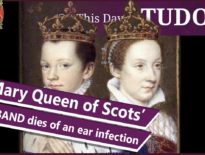On this day in Tudor history, 4th December 1514, merchant tailor and leading member of the Lollard community in London, Richard Hunne died while imprisoned in the Lollard's Tower at St Paul's.
Hunne, who had been arrested for heresy in October 1514, was discovered hanging from the ceiling of his cell. The Bishop of London and his chancellor claimed that Hunne had used his own silk girdle to commit suicide, but a coroner's inquest ruled that the hanging was faked and that Hunne was murdered.
But why was Richard Hunne murdered? And why had this merchant tailor been arrested in the first place? Was it just for heresy, or was there more to it?
Find out all about Hunne, his arrest, the charges against him, his death and what happened next, in today's talk.
You can read more about Hunne's case in John Foxe's Book of Martyrs at https://www.exclassics.com/foxe/foxe142.htm
Also on this day in Tudor history, 4th December 1555, in Rome, papal sentence was passed on Thomas Cranmer, resulting in him being deprived of his archbishopric. Permission was also granted for his fate to be decided by the secular authorities. Thomas Cranmer went on to recant his Protestant faith on several occasions but was still executed by being burned at the stake. Why? Find out in last year’s video:
Also on this day in history:
- 1531 – Execution of Rhys ap Gruffudd for treason. He was beheaded after being accused of plotting against the King, although his biographer, R.A. Griffiths, points out that his trial was a “show trial” consisting of contrived testimonies and coached witnesses.
- 1557 – Death of Robert King, Abbot of Thame and Bishop of Oxford. He was buried in Oxford Cathedral. King was one of the judges who sat in judgement at the trial of Thomas Cranmer in 1555.
- 1585 – Death of John Willock, physician and Scottish reformer, at Loughborough in Leicestershire. He was buried at his church, All Saints, in Loughborough. Willock became the Chaplain of Henry Grey, Marquis of Dorset, and father of Lady Jane Grey, in the 1540s.
- 1595 – Death of William Whitaker, theologian and Master of St. John's College, Cambridge, at the master's lodge after going to bed with a hot “ague”. He was buried at St John's. His works included Liber precum publicarum (1569), Ad rationes decem Edmundi Campiani jesuitæ responsio (1581), responses to Nicholas Sander and Edmund Campion, Disputatio ad sacra scriptura and Adversus Thomae Stapletoni (1594).
- 1609 – Death of Alexander Hume, Scottish poet and writer. He is known for his 1599 “Hymnes, or Sacred Songs”, which includes his great poem “Of the Day Estivall” which describes a summer's day, from dawn until dusk.
Transcript:
4 December
On this day in Tudor history, 4th December 1514, merchant tailor and leading member of the Lollard community in London, Richard Hunne died.
Hunne had been arrested for heresy, and imprisoned in “Lollards' Tower” at St Paul’s on 14th October, following the discovery of a Wycliffite Bible at his home. His body was discovered hanging in his cell from a silk girdle. It was claimed that he had committed suicide, but a coroner's jury ruled that the hanging had been faked, and that he had been murdered.
Let me tell you more about Hunne, his arrest and death, but first let me explain what a Lollard was.
A Lollard was a follower of the teachings of the 14th century theologian John Wycliffe. Wycliffe denied transubstantiation, that is to say the miracle of the Eucharist, emphasised the authority of scripture over all else, and attacked the role of the pope, regarding the office as having no scriptural basis and the pope as the Antichrist.
And now let me introduce you to Richard Hunne…
Nothing is known of Hunne’s early life, but he worked as a merchant tailor in the parish of St Margaret New Fish Street, in London, and was a wealthy man. His wife was the daughter of Thomas Vincent, a leading member of London’s Lollards.
In 1511, Hunne and his wife lost their five-week-old son, Stephen, and the usual practice of the time was to give Thomas Drifield, rector of St Mary’s, Whitechapel, the baby’s bearing sheet from the christening as a mortuary payment. Hunne refused to do this, saying it was not due, and in 1512, the rector sued Hunne for payment at the Archbishop of Canterbury’s Court of Audience at Lambeth. Unsurprisingly, the court found in favour of the rector. Then, in December 1512, Hunne turned up at vespers at St Mary’s, only to find that Thomas Marshall, the priest, refused to go on with the service until he had left, crying out “Hunne, thou art accursed and standest accursed!”, meaning that Hunne was excommunicated.
In January 1513, Hunne sued Marshall at the King’s Bench for slander, pointing out that the priest’s words had damaged his business and reputation. He also sued Marshall, Drifield, and all those who had been involved in Drifield’s case against him over the mortuary payment, for praemunire. The case was adjourned, but then heresy proceedings began against Hunne.
On 14th October 1513, a search was carried out on Hunne’s home and a Wyclifite Bible was found. Hunne was arrested and imprisoned at St Paul’s Cathedral in the Lollard’s Tower. On 2nd December, Hunne was taken to Fulham and examined by Richard Fitzjames, Bishop of London. Martyrologist John Foxe writes that he was questioned regarding six different issues – speaking out against the payment of tithes, saying that bishops and priests were the scribes and pharisees that crucified Christ, saying that bishops and priests were teachers and preaches but not “doers” and that they took “all things” but gave nothing, saying that he defended a woman named Joan Baker and her opinions, a woman who had “abjured of many great heresies” and that he’d said that the bishop of London and his officers “have done open wrong to the said Joan Baker, in punishing her for heresy; for her sayings and opinions be according to the laws of God; wherefore the bishop and his officers are more worthy to be punished for heresy than she is.”. He was also accused of “keeping divers English books, prohibited and damned by the law; as the Apocalypse in English, Epistles and Gospels in English, Wickliff's damnable works, and other books, containing infinite errors, in the which he hath been long time accustomed to read, teach, and study daily.”
Following his examination, Hunne was sent back to Lollard’s Tower, where, according to Foxe, the bishop’s summoner Charles Joseph was relieved of his custody and bell-ringer John Spalding was put in charge. On the morning of this day in history, 4th December 1514, Hunne was discovered dead in his cell. Fitzjames and his chancellor, Dr William Horsey, stated that Hunne had committed suicide, that he had hanged himself from a hook in the ceiling used his silk girdle. They then tried him posthumously for heresy, adding to the charges that he had denied the miracle of the Eucharist and the veneration of saints. On 20th December 1514, Hunne’s remains were burnt.
However, a coroner’s jury found that Hunne had been murdered due to there being signs of a struggle and Hunne being tortured. They ruled that he had been throttled to death and then his dead body hanged to make it look like suicide. Dr Horsey and Hunne’s gaolers, Charles Joseph and Spalding were arrested, Joseph while trying to flee.
Hunne’s death caused such a scandal that Henry VIII heard of it and ordered his council to look into it. The people of London were angry and were sympathetic to Hunne’s family. So high was feeling in London, that Bishop Fitzjames appealed to Cardinal Wolsey to prevent his chancellor from being tried, concerned that he’d be found guilty “though he was as innocent as Abel”. Horsey escaped trial, and John Foxe records that, instead, he was sent away from London to Exeter, and sadly Hunne’s property was not restored to his widow and children because he had been found guilty of heresy.
Richard Hunne’s story is a sad one. Although he did hold beliefs that were deemed heretical then, his arrest and murder appear to have been more about the trouble he was causing for the clergy in London.



His arrest was probably political or personal as well, because of the trouble with him and his Rector. Heresy cases often started as a personal grudge because you could report someone anonymously. His murder certainly had motives which were political and personal as he did cause a bit of trouble.
But how sad his story was anyway. Losing a baby and you had to pay the priest the baptism sheet or robes, probably in lieu of money. That’s heart breaking. There is a paperback book on the case.
The Murder of Richard Hunne..London in the Early Reign of Henry Viii by M. Clement Hall which is available on Amazon.